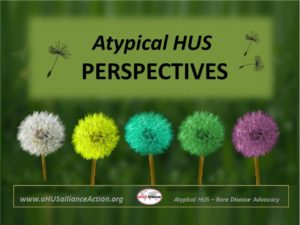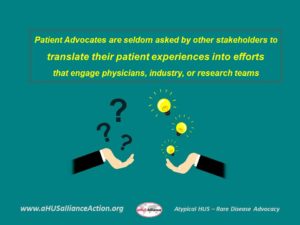
Sometimes it can be a real eye-opener to view issues and information from varied perspectives, especially when the topic relates to niche insights regarding rare diseases such as atypical HUS (aHUS). People and groups involved in the “aHUS space” include stakeholders with a wide variety of backgrounds and interests: patients, family caregivers, clinicians, academics, industry, research teams, national aHUS advocacy groups, rare disease organizations, and topic-specific groups (e.g. genetics, complement, kidney disease). The non-profit organization that serves to connect information and efforts among aHUS stakeholders from around the world is the aHUS Alliance. Whether you’re patient or physician, caregiver or clinical trial leader, the aHUS Alliance provides original content that can deepen discussions and add insight into what’s trending and what’s important in fields related to aHUS advancements.
aHUS Perspectives. It’s important to realize that atypical HUS diagnosis issues, treatment considerations, clinical profiles, and patient experiences are extremely diverse. The disease can vary widely in organs affected and the severity of impact on the kidneys, heart, GI tract, and other organs. Healthcare policy and access to treatment quite different around the world, and sometimes even within regions of a single nation. Atypical HUS can strike any age group, with chronic episodes of aHUS activity lasting many years, or one short but life-threatening bout that may not occur until late adulthood. Some nations have centralized healthcare systems, which mean that information and treatment flows through one ‘clearing house’ in an organized, efficient pathway for physicians and patients alike.
Patients in quiet periods of aHUS activity have difficulty describing their health status and medical uncertainty exists as to whether (or if) their aHUS will occur again. Phrases such as “dormant aHUS”, “in remission”, or “living with aHUS” all seem to miss the mark – and implications are unclear with the term ‘smouldering aHUS”. Many aHUS families prefer to simply enjoy their hard-won but regained wellness and lifestyles, even as they secretly worry about statistics that atypical HUS may strike again. Descriptions and actions will vary from patient to patient, nation to nation, medical assessment to therapeutic or research approach. Similar to the parable of the blind men and the elephant, those who have never touched on aHUS in experience or research will have difficulty conceptualizing the complexity of atypical HUS as a rare disease with diverse presentations and implications. If you’re not aware of drug access problems for physicians, you’re missing a vital part of the factors that can affect bringing future aHUS therapeutic drugs to market.
Patients are people, and most have a strong desire to live their ‘best life’, preferring to adopt a positive “can do’ attitude rather than feeling trapped in a culture of illness or being defined by their rare disease diagnosis. Patient inclusion and engagement means more than simply sharing our family’s journey with aHUS. The atypical HUS community of patients and family caregivers want to participate in research and would like to participate at conferences. Conversely, aHUS research has been slowed by low identification and participation rates. When pondering these diverse realities, one needs to consider a variety of perspectives before implementing goals or planning initiatives.
Better Informed. Better Together. People and groups can choose to hunker down within their own experiences or in isolated circles of engagement. Or they can deliberately act to engage others in discussion and collaborative actions that can deepen the conversation, find new paths, and shape meaningful movement forward with broader benefit. Data silos act as one more barrier to drug discovery and medical innovation. Echo chambers on social media also do little to add genuine insights. Patient advocates often underestimate their capability as influencers, and rarely are they asked by other stakeholders to translate their patient experiences into efforts that engage physicians, industry, or research teams. Explore the genesis of ‘original content’ by aHUS patient organizations, ponder where and why they were created. Looking at social media accounts can provide targeted focus regarding an individual or group’s aHUS interests, concerns, activities, and viewpoints.

Opinions. Research. Patient Experiences. Advocacy Topics. Patient Engagement. Clinical Issues. Trends and Concerns in the aHUS Space. Alone such topics stand out as matters important to aHUS families and those who treat them. When one examines the interface of these separate areas, they provide a valuable framework that illustrates a more intricate, authentic picture of the aHUS arena. Connecting the dots between various groups, aspects of information, and efforts may seem a daunting task but to borrow poet Robert Browning’s phrase, ‘a man’s reach should exceed his grasp’ – and so the aHUS Alliance goes beyond its international team of volunteers to aid information flow, join in collaborations, and link people, groups, and initiatives in the aHUS space with needs-based advocacy across varied perspectives.
The aHUS Alliance highlights atypical HUS advocacy in more than 30 nations, advancements in aHUS medicine and research, and topics of broad interest to all stakeholders in the aHUS arena. The aHUS Alliance presents these varied perspectives in the aHUS space:
On the Minds of Physicians & Researchers: aHUS Perspectives
Interview: Dr Gianluigi Ardissino (Italy: Centro SEU, Center for HUS Control)
Interview: Dr Adi Lungu (aHUS in Romania)
Interview: Dr Ralf Reski (Drug Discovery, Moss FH)
Interview: Dr. Nicole van de Kar, Dr. Jack Wetzels, Dr. Caroline Duineveld, and Dr. Kioa L. Wijnsma (aHUS in Netherlands & CUREiHUS)
Article : Dr Fadi Fakhouri, joint interview on aHUS & Pregnancy
Guest Article: Dr Mignon McCullogh & Dr Errol Gottlich (Global Panel Proposal for aHUS Drug Access)
Interview: Professor Stephen Perkins, Complement Database Leader
(See also the aHUS Alliance Atypical HUS Clinical Channel on YouTube)
On the Minds of Patients & Caregivers
Patient & Caregivers (aHUS Patient Voices, YouTube video channel)
Rare Disease Caregivers
Kamal D Shah (founder of aHUS India & co-founder NephroPlus Dialysis Centres)
See also: An aHUS Patient Entrepeneur?
Sarah Staffiere (parent of a young son with aHUS, University Professor)
Cameron James (aHUS family caregiver: young daughter & husband, Singer-Songwriter)
Expertise in aHUS & TMA Diagnosis and Care
The Search for Centres of Excellence What constitutes an aHUS Expert Center?
Paris, FR: Whistle-stopTour 2018
Newcastle upon Tyne, UK: Whistle-stopTour 2018
Bergamo IT: Whistle-stopTour 2018
Milan, IT: Whistle-stopTour 2018
Our Resource Networks:
aHUS Clinician/Researchers & aHUS/TMA Study Centers
aHUS Advocacy Snapshots
aHUS in China
aHUS in Poland
aHUS in Japan
aHUS in the Netherlands: The Dutch Approach
aHUS in Norway
2016 aHUS Global Poll (Survey Info & Results, Whitepapers: Drug & Treatment Access, aHUS & Dialysis Insights )
Rare Disease Day 2018: Cohort 1
Rare Disease Day 2018: Cohort 2
The Reluctant Advocacy (Series): The Journey Starts Epilogue
The Journey of the Reluctant Advocate (series entirety as a pdf, Book)
Samko & family: Tale from Slovakia
Patient Engagement Topics
Global aHUS Patients’ Research Agenda (Feb 2019): article, video, pdf
Patients as Partners
Pathways of Patient Engagement
Patient Involvement: Opportunities & Issues
Collaborative Partnership in Research: Global aHUS Registry

